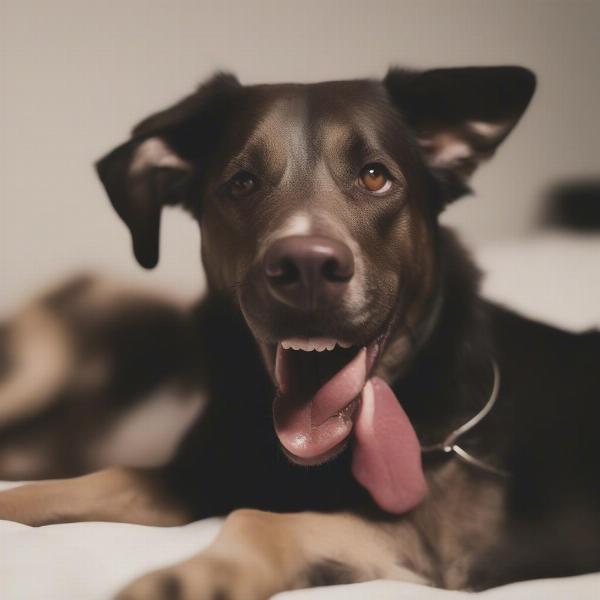Old dog panting at night can be concerning for owners. While occasional panting is normal, persistent or excessive panting, especially during the night, can indicate an underlying issue. This article explores the potential causes of old dog panting at night and provides practical solutions to help your furry friend rest comfortably.
Understanding Why Your Senior Dog Pants at Night
Several factors contribute to nighttime panting in older dogs. Age-related changes like decreased heart and lung efficiency can make breathing more laborious, leading to increased panting. Pain, particularly from conditions like arthritis, can also manifest as increased panting, especially at night when your dog is less distracted.  Senior dog panting at night
Senior dog panting at night
Furthermore, anxiety and cognitive dysfunction syndrome (CDS), often referred to as dog dementia, can cause increased anxiety and restlessness at night, resulting in panting. Changes in routine, loud noises, or even the darkness itself can trigger anxiety in senior dogs. Metabolic disorders like Cushing’s disease or diabetes can also lead to increased panting.
Medical Conditions That Cause Panting in Older Dogs
Certain medical conditions can directly cause panting in older dogs. Heart problems, such as congestive heart failure, make it harder for the heart to pump blood efficiently, leading to breathlessness and panting. Lung diseases, including pneumonia and tumors, can restrict airflow and cause difficulty breathing, resulting in increased panting, especially at night.
Obesity also puts extra strain on a dog’s respiratory system, contributing to panting. Maintaining a healthy weight is crucial for your senior dog’s overall health and can significantly reduce panting.
Practical Solutions for Nighttime Panting in Older Dogs
Addressing nighttime panting involves identifying and managing the underlying cause. A thorough veterinary checkup is essential to diagnose any medical conditions. If your dog is diagnosed with a medical condition, follow your veterinarian’s treatment plan diligently. Pain management, through medication or alternative therapies like acupuncture, can help alleviate pain-related panting.
Creating a calm and comfortable sleeping environment can also significantly improve your dog’s nighttime comfort. Ensure the room is well-ventilated and at a comfortable temperature. A dog crate fan can help circulate air and keep your dog cool. Providing a comfortable bed and minimizing noise distractions can promote restful sleep.
For anxiety-related panting, consider using calming aids such as pheromone diffusers or anxiety vests. Maintaining a consistent routine and providing plenty of opportunities for mental and physical stimulation during the day can also reduce anxiety at night. For dogs with CDS, medication and environmental enrichment can help manage their symptoms and improve their quality of life.
When to Seek Veterinary Help
While occasional panting is normal, consult your veterinarian if your older dog experiences persistent or excessive panting, especially at night, If the panting is accompanied by other symptoms such as coughing, wheezing, loss of appetite, or lethargy, seek immediate veterinary attention.
Conclusion
Old dog panting at night can stem from various factors, ranging from normal age-related changes to underlying medical conditions. By understanding the potential causes and implementing practical solutions, you can help your senior dog breathe easier and sleep more soundly. Don’t hesitate to consult your veterinarian if you’re concerned about your dog’s panting. Early diagnosis and treatment can significantly improve your dog’s comfort and quality of life. Remember, a comfortable senior dog is a happy senior dog.
FAQ
- Is it normal for older dogs to pant more? Older dogs may pant more due to age-related changes in their respiratory system. However, excessive or persistent panting should be evaluated by a veterinarian.
- How can I tell if my dog’s panting is a sign of pain? Pain-related panting is often accompanied by other signs such as restlessness, whimpering, changes in gait, or reluctance to move.
- What can I do to create a calming environment for my senior dog? Provide a comfortable bed, minimize noise and light distractions, maintain a consistent routine, and consider using calming aids such as pheromone diffusers.
- When should I be concerned about my dog’s panting? Consult your veterinarian if your dog’s panting is persistent, excessive, or accompanied by other symptoms like coughing, wheezing, or lethargy.
- Can obesity contribute to panting in older dogs? Yes, obesity puts extra strain on the respiratory system, making it harder for dogs to breathe and leading to increased panting.
- What are some common medical conditions that cause panting in older dogs? Heart and lung diseases, metabolic disorders like Cushing’s disease and diabetes, and pain, particularly from arthritis, can all contribute to panting in senior dogs.
- Are there any medications that can help reduce panting in older dogs? Medications to address underlying medical conditions, such as heart failure or pain, can help reduce panting. Your veterinarian can recommend appropriate medications based on your dog’s specific needs.
ILM Dog is your trusted source for expert advice on all aspects of dog care. We specialize in providing practical and reliable information on dog breeds, health, training, nutrition, grooming, and more. Whether you’re a new dog owner or a seasoned pro, we’re here to help you provide the best possible care for your canine companion. For personalized advice or to explore our range of dog products and accessories, contact us at [email protected] or +44 20-3965-8624. Visit ILM Dog today for more helpful resources and expert guidance.